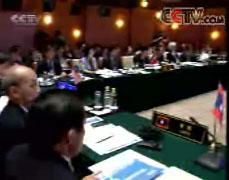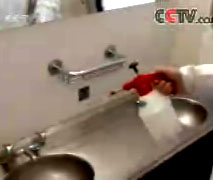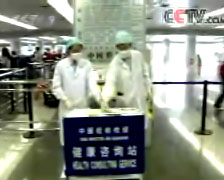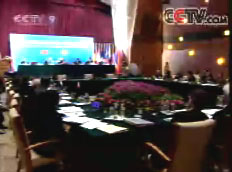 The China-ASEAN entry-exit quarantine meeting on SARS has been held in Beijing. And a joint action plan was adopted to reduce the negative effects of SARS on international tourism and trade. The China-ASEAN entry-exit quarantine meeting on SARS has been held in Beijing. And a joint action plan was adopted to reduce the negative effects of SARS on international tourism and trade.
Faced with the challenge and threat of SARS, China and the Association of Southeast Asian Nations have joined hands to prevent the international spread of the disease. At recent customs quarantine meeting on SARS, the two sides adopted an action plan and one passenger says that these regulations should be adopted not only in China and ASEAN countries, but in western countries as well. It will be very helpful in the fight against SARS if patients can be treated whoever they are and wherever they are found.
In a globalized world, the prevention and treatment of any infectious disease is no longer limited to one country or region. It is the common responsibility and obligation of the whole world. As part of global efforts to fight the SARS epidemic, an international anti-SARS forum was held in Beijing this week to implement the joint communiqu岢 issued in the China-ASEAN special meeting on SARS. Research continues in the hope that a vaccine for the disease can be developed as soon as possible.
Delegates from the ASEAN countries have their temperature taken the minute they arrive in China and then when they step into the meeting hall. Asked whether they are used to this kind of check, they say they are here to attend a customs quarantine management meeting and must to practice what they themselves advocate.
Senior representatives responsible for quarantine matters from 10 ASEAN countries, and officials and experts of the World Health Organization are invited to the meeting. After poring over the details, officials approved an action plan to coordinate customs quarantine measures in their own countries.
“We should not only strengthen entry-exit quarantine management on SARS but also take coordinated measures to reduce its negative impact on the general economy, tourism and transportation,” said Song Mingchang, department director of State Admin. Of Quality Supervision, Inspection & Quarantine.
 The spreading SARS epidemic posed a great challenge to China. The disease was not properly checked at the beginning because of the suddenness of the disease, lack of experience in epidemic prevention and treatment as well as inadequate information exchange. People’s health and lives were put risk and a series of forceful measures was taken to forge three defense lines in border ports, all domestic transportation hubs and other important branch lines to prevent the spread of SARS. Over the past month, all entry and exit points have checked about 13 million passengers and required them to fill in health declaration forms.
The spreading SARS epidemic posed a great challenge to China. The disease was not properly checked at the beginning because of the suddenness of the disease, lack of experience in epidemic prevention and treatment as well as inadequate information exchange. People’s health and lives were put risk and a series of forceful measures was taken to forge three defense lines in border ports, all domestic transportation hubs and other important branch lines to prevent the spread of SARS. Over the past month, all entry and exit points have checked about 13 million passengers and required them to fill in health declaration forms.
Song Mingchang says that so far, China has found five SARS cases among inbound and outbound passengers and have taken timely quarantine and treatment measures. People they had had close contact with were medically examined and vehicles they were travelling in were all disinfected to prevent the international spread of SARS.
The decisive measures taken in combating SARS have achieved encouraging results. There has been no report of new SARS cases in China’s mainland in recent days and the WHO has lifted travel restrictions on Guangdong Province where the disease originated. Foreign tourists say they are not afraid of the disease; they say they believe that the epidemic SARS seems to have been effectively contained in many countries, including China. The number of cases is decreasing daily which is a sign that the measures have been effective. Mr. Henk Bekedam, WHO representative in China said that the Chinese government has made great efforts to contain the disease and these efforts have so far been very effective. The decreasing number of infected cases was a good indication of this.
It is true that the epidemic has been effectively contained, but continuing to prevent and treat the disease is a demanding and long-term task. The prevention and treatment of any infectious disease no longer the responsibility of one country or region alone, it is the common responsibility and obligation of the whole world. Strengthened cooperation between China and ASEAN countries in fighting SARS is important for the final global control of the disease. With this consensus the meeting approved an action plan agreeing that none of the signatories would deny entry to suspected SARS patients at their own ports. SARS cases will be transferred to proper isolation areas and treated without discrimination. These regulations have been welcomed by many passengers.
 The number of travelers to Singapore, Malaysia, Thailand, Hong Kong and Macao accounts for 70 percent to 80 percent of outbound tourists in China. May is usually a peak season for travel. The sudden outbreak of SARS dealt a severe blow to tourism between China and ASEAN countries. The approval of the action plan together with China’s easing of travel restrictions on Singapore, Malaysia and Thailand are good news for the revival of tourism between these countries.
The number of travelers to Singapore, Malaysia, Thailand, Hong Kong and Macao accounts for 70 percent to 80 percent of outbound tourists in China. May is usually a peak season for travel. The sudden outbreak of SARS dealt a severe blow to tourism between China and ASEAN countries. The approval of the action plan together with China’s easing of travel restrictions on Singapore, Malaysia and Thailand are good news for the revival of tourism between these countries.
“The implementation of the action plan will mobilize resources of the entire society to safeguard the hygiene and safety of inbound and outbound personnel. It’s a good basis for all travel agencies to develop our business and greatly lower our costs. It will increase the confidence of travelers and will ensure the early revival of the tourism industry,” said Wang Yanguan from China International Travel Service Head Office.
The plan also allows ships found carrying possible SARS cases to contact the nearest port authority of a signing party and stop at the nearest harbor for emergency treatment. The ASEAN bloc has been China’s fifth largest trading partner for 10 consecutive years. In 2002, the trade volume between China and ASEAN countries reached a historical high of 54.8 billion US dollar. The SARS epidemic had little impact on trade between the two sides in the first quarter of this year, with a 45 percent increase over the same period last year. But the delayed impact is likely to be seen in the near future. At the meeting, the two sides have also agreed not to conduct SARS-related disinfection measures on imported and exported goods so that accelerated trade between the two sides won’t be affected.
 “According to the WHO’s report on April 11 there has been no indication so far that goods or animals from SARS affected areas will be infected with the disease. This move helps enterprises to avoid the additional cost of taking special disinfecting measures in trade transactions between China and ASEAN countries. It will also ensure orderly and healthy trade between the two sides,” said Lu Kejian, deputy director of Asian Department, Ministry of Commerce.
“According to the WHO’s report on April 11 there has been no indication so far that goods or animals from SARS affected areas will be infected with the disease. This move helps enterprises to avoid the additional cost of taking special disinfecting measures in trade transactions between China and ASEAN countries. It will also ensure orderly and healthy trade between the two sides,” said Lu Kejian, deputy director of Asian Department, Ministry of Commerce.
|